新职业英语视听说教案U3-1-2次
- 格式:doc
- 大小:77.00 KB
- 文档页数:8
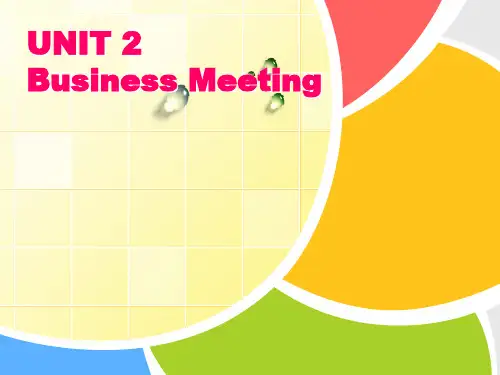
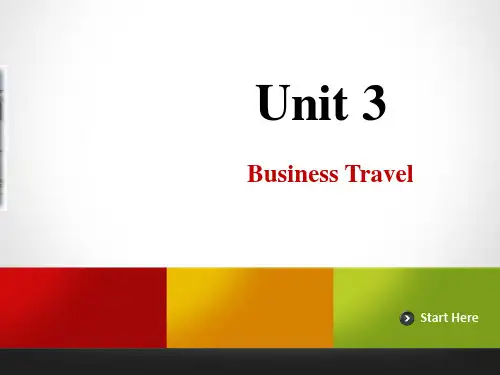

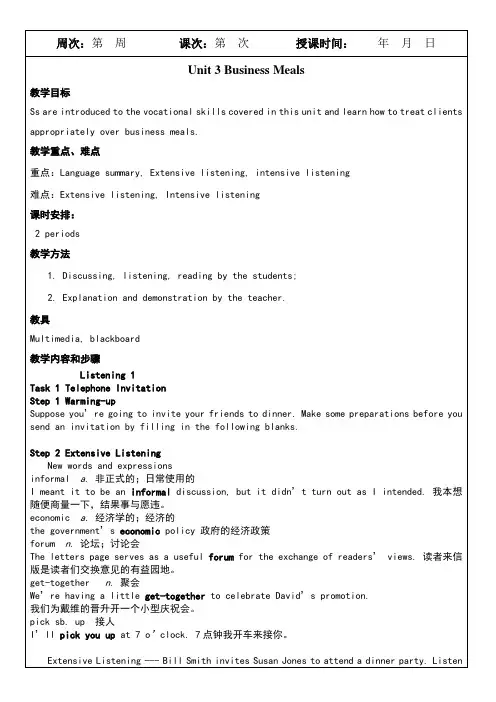
Unit 3 Business Meals教学目标Ss are introduced to the vocational skills covered in this unit and learn how to treat clients appropriately over business meals.教学重点、难点重点:Language summary, Extensive listening, intensive listening难点:Extensive listening, Intensive listening课时安排:2 periods教学方法1.Discussing, listening, reading by the students;2.Explanation and demonstration by the teacher.教具Multimedia, blackboard教学内容和步骤Listening 1Task 1 Telephone InvitationStep 1 Warming-upSuppose you’re going to invite your friends to dinner. Make some preparations before you send an invitation by filling in the following blanks.Step 2 Extensive ListeningNew words and expressionsinformal a.非正式的;日常使用的I meant it to be an informal discussion, but it didn’t turn out as I intended. 我本想随便商量一下,结果事与愿违。
economic a.经济学的;经济的the government’s economic policy 政府的经济政策forum n.论坛;讨论会The letters page serves as a useful forum for the exchange of readers’ views. 读者来信版是读者们交换意见的有益园地。
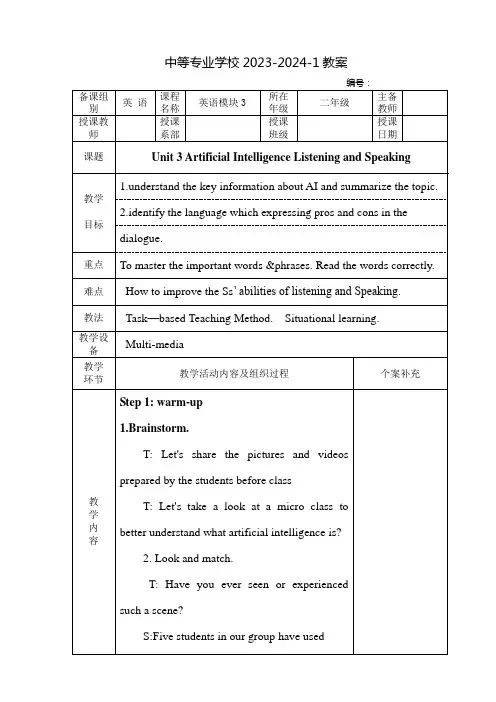
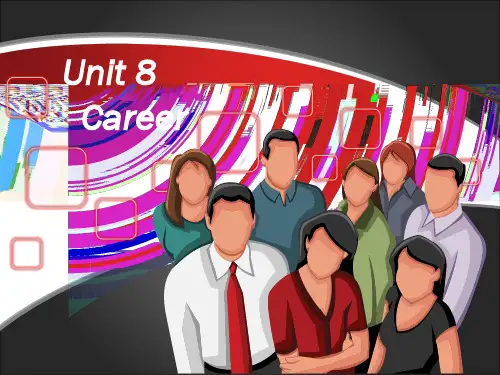

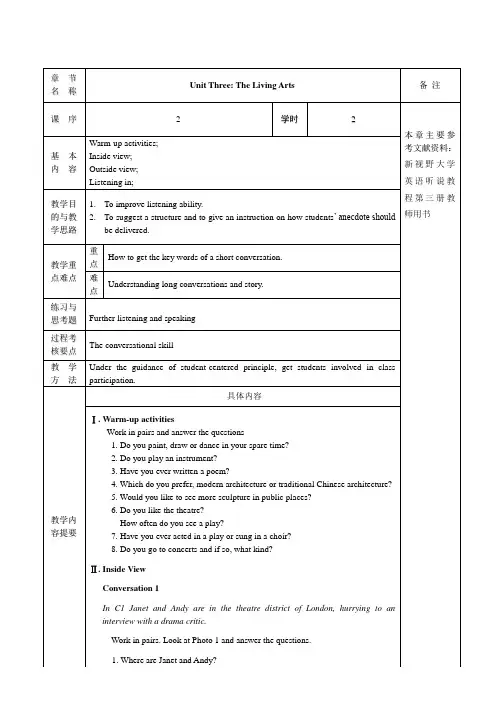
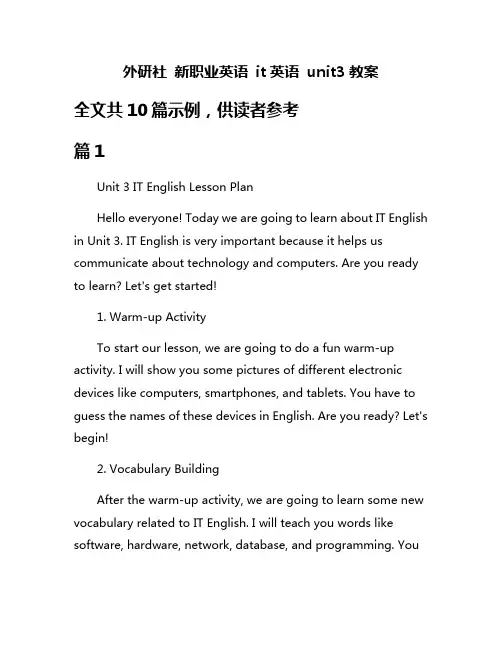
外研社新职业英语it英语unit3教案全文共10篇示例,供读者参考篇1Unit 3 IT English Lesson PlanHello everyone! Today we are going to learn about IT English in Unit 3. IT English is very important because it helps us communicate about technology and computers. Are you ready to learn? Let's get started!1. Warm-up ActivityTo start our lesson, we are going to do a fun warm-up activity. I will show you some pictures of different electronic devices like computers, smartphones, and tablets. You have to guess the names of these devices in English. Are you ready? Let's begin!2. Vocabulary BuildingAfter the warm-up activity, we are going to learn some new vocabulary related to IT English. I will teach you words like software, hardware, network, database, and programming. Youwill repeat after me to remember these words better. Are you ready? Let's start with the first word, software.3. Listening PracticeNext, we are going to do a listening practice exercise. I will play a recording of a conversation between two people talking about their favorite apps on their smartphones. You have to listen carefully and then answer some questions about the conversation. Are you ready? Let's listen to the recording now.4. Reading and Writing ActivityIn this part of the lesson, we are going to read a short passage about the history of computers. After reading the passage, you will write a summary of what you have learned. This will help you improve your reading and writing skills in English. Are you ready? Let's start reading the passage now.5. Speaking PracticeFor the speaking practice activity, we are going to do a role play exercise. I will pair you up with a classmate and give you a scenario to act out. For example, one of you will be a customer calling tech support for help with a computer problem, and the other will be the tech support agent. This will help you practicespeaking English in a real-life situation. Are you ready? Let's begin the role play exercise.6. Review and HomeworkAt the end of the lesson, we will review everything we have learned about IT English. I will ask you some questions to see how much you have understood. For homework, I will ask you to write a short paragraph about your favorite electronic device and why you like it. This will help you practice writing in English outside of the classroom. Are you ready to review and do your homework? Let's finish the lesson strong!That's it for today's IT English lesson. I hope you had fun learning about technology and computers. Remember to practice your English every day to improve your skills. See you next time! Bye bye!篇2Hello everyone! Today, we are going to talk about the lesson plan for Unit 3 of the New Dynamic English IT English textbook.First, let's start with a warm-up activity to get our brains thinking about IT English. We can watch a short video clip aboutdifferent IT professions and discuss what we see. This will help us get familiar with the topic and vocabulary.Next, we will move on to the vocabulary section. We will learn new words related to IT jobs such as programmer, web designer, and IT technician. We can play games like charades or memory matching to practice and reinforce our knowledge of these words.After that, we will dive into the grammar part of the lesson. We will learn about different verb tenses used in the context of IT jobs. For example, we will learn how to talk about past experiences, present responsibilities, and future goals in the IT industry.Following the grammar section, we will do a reading comprehension activity. We will read a short passage about a day in the life of an IT professional and answer questions to check our understanding. This will help us improve our reading skills and learn more about the daily tasks of IT workers.Finally, we will wrap up the lesson with a fun project. We can work in groups to create a presentation about our dream IT job. We can use our imagination to come up with creative ideas and present them to the class. This activity will give us a chance topractice our speaking and listening skills while also showcasing our knowledge of IT English.That's all for today's lesson plan! I hope you are excited to learn more about IT English and explore the world of technology. Let's get started and have a great time learning together! Thank you for listening!篇3Hi everyone, today I’m going to share with you our lesson plan for Unit 3 of the New Dynamic English IT English textbook. Are you ready? Let’s dive in!First, we’ll start with the warm-up activity. We’ll have a quick discussion about different IT jobs and what they involve. For example, we can talk about what a software developer does, or what a data analyst does. It’s important for us to understand the different roles in the IT industry.Next, we’ll move on to the vocabulary section. We’ll learn some key words and phrases related to IT jobs, such as “programming”, “networking”, and “cybersecurity”. We’ll practice saying and writing these words to make sure we remember them.After that, we’ll do a reading activity. We’ll read a short passage about a day in the life of an IT professional. We’ll discuss what we learned from the passage and answer some questions to test our understanding.Then, we’ll do a listening activity. We’ll listen to a conversation between two IT professionals discussing a new project. We’ll answer some questions about the conversation to check our listening skills.Finally, we’ll finish the lesson with a speaking act ivity. We’ll work in pairs to role-play a job interview for an IT position. We’ll take turns being the interviewer and the interviewee, and practice asking and answering questions about our skills and experience.That’s it for today’s lesson plan. I hope you’re excited to learn more about IT English and the exciting career opportunities in the IT industry. Let’s work hard and have fun learning together!篇4Unit 3: Jobs in ITHello everyone! Today, we are going to talk about some cool jobs in IT. IT stands for Information Technology, which is all about using computers and technology to do cool stuff.1. What is IT?IT is a field that uses computers to store, retrieve, transmit, and manipulate data. It includes everything from designing websites to creating video games to fixing computer problems.2. Jobs in ITThere are lots of different jobs you can do in IT. Here are a few examples:- Web Developer: A web developer designs and creates websites. They need to know programming languages like HTML, CSS, and JavaScript.- Software Engineer: A software engineer designs and develops computer programs. They work on things like apps, games, and operating systems.- Network Administrator: A network administrator manages computer networks, making sure they are running smoothly. They also help with things like setting up new devices and troubleshooting problems.- IT Support Specialist: An IT support specialist helps people with computer problems. They answer questions, fix issues, and teach people how to use technology.3. Why IT?There are lots of reasons why IT is a great field to work in. For one, it's always changing and evolving, so there are always new things to learn. Plus, IT jobs are in high demand, so you can make a good salary and have lots of job opportunities.4. How to Get StartedIf you're interested in a career in IT, there are lots of ways to get started. You can take classes in computer science or IT, get certifications in specific areas, or even teach yourself by practicing coding and building projects.So, there you have it! IT is a fun and exciting field with lots of cool jobs to choose from. Whether you want to design websites, develop apps, or help people with tech problems, there's something in IT for everyone. Good luck on your IT journey!篇5Title: My Lesson Plan for Unit 3 of New Dynamic English IT EnglishHi everyone! Today I want to share with you my super cool lesson plan for Unit 3 of New Dynamic English IT English. This unit is all about talking about technology and the internet, so get ready to learn some awesome new vocab and phrases! Let's dive in!1. Warm-up (10 minutes)To start off the lesson, I'll ask the students to talk about their favorite apps and websites. They can share with the class what they like to do online and why. This will get them thinking about the topic of the lesson and help them practice their speaking skills.2. Introduction to New Vocabulary (15 minutes)Next, I'll introduce the new vocabulary words for this unit. We'll learn words like "browser," "download," "upload," and "firewall." I'll make sure to explain each word clearly and give examples so that the students can understand and remember them.3. Reading and Comprehension (20 minutes)After learning the new vocabulary, we'll read a text together about online security. The students will read the text out loud,and then we'll discuss it as a class. I'll ask questions to check their understanding and encourage them to share their opinions.4. Speaking Practice (15 minutes)In this part of the lesson, the students will work in pairs to practice using the new vocabulary and phrases. I'll give them a list of questions to ask each other, like "Have you ever had a virus on your computer?" and "What do you do to protect your online privacy?" This will help them practice speaking and listening skills.5. Writing Activity (20 minutes)To wrap up the lesson, the students will write a short paragraph about their experience with technology. They can talk about their favorite devices, apps, and websites, as well as any challenges they've faced online. I'll remind them to use the new vocabulary and phrases we've learned in class.6. Homework (5 minutes)For homework, I'll ask the students to research a new technology trend or innovation and write a short report about it. They can present their findings to the class in the next lesson. This will help them practice their research and presentation skills.I hope you like my lesson plan for Unit 3 of New Dynamic English IT English. Let's have a great lesson together and learn lots of cool new things! Thank you for listening!篇6Unit 3 Lesson PlanHello everyone! Today we are going to learn about IT English in our New Horizon English textbook. Are you ready? Let's get started!Objective:- Learn new vocabulary related to IT- Understand different jobs in the IT industry- Practice listening and speaking skills in EnglishWarm-up:Let's start by asking a question: Do you know what IT means? IT stands for Information Technology. It's all about computers and technology!Vocabulary:1. Computer Programmer - someone who writes code to create computer software2. Web Designer - someone who designs websites3. Network Administrator - someone who manages computer networks4. Data Analyst - someone who analyzes data to find patterns and trends5. IT Support - someone who helps people with computer problems6. Software Engineer - someone who designs and develops softwareIntroduction:Now that we know the vocabulary, let's talk about different jobs in the IT industry. You can be a computer programmer and write code like a wizard! Or you can be a web designer and create beautiful websites. There are so many cool jobs in IT!Activities:1. Role-play: Let's pretend we are computer programmers writing code. Use your imagination and create a program!2. Drawing: Draw a picture of a website as a web designer. Be creative and make it look awesome!3. Group discussion: Talk about different IT jobs and choose one that you would like to do in the future.Listening:Listen to a recording about IT jobs and try to understand the different roles in the IT industry. Pay attention to the vocabulary we learned earlier!Conclusion:Great job, everyone! Today we learned a lot about IT English and different jobs in the IT industry. Keep practicing your English skills and you will become a master in IT!Homework:Write a short paragraph about your favorite IT job and why you would like to do it in the future. Don't forget to use the vocabulary we learned in class!That's all for today. See you next time! Happy learning!篇7Title: My Lesson Plan for Unit 3 of New Dynamic English IT EnglishHey guys, today I’m going to share with you my lesson plan for Unit 3 of the New Dynamic English IT English course. This unit is all about learning new vocabulary and phrases related to IT, so let’s get started!First, we are going to start the lesson with a fun warm-up activi ty. We will play a game called “IT Vocabulary Memory Match”. I will make cards with IT-related words on one side and their meanings on the other side. Students will work in pairs to match the words with their meanings. This will help them review the vocabulary they learned in the previous lesson.Next, we will move on to the new vocabulary in Unit 3. I will introduce words like “software”, “hardware”, “network”, “database”, and “programming”. I will use flashcards and pictures to help students understand the meaning of each word. We will practice pronouncing the words together to improve their pronunciation.After learning the new vocabulary, we will do a listening activity. I will play a short audio clip about a computer programmer talking about his job. Students will listen carefully and answer some questions about the audio. This will help them improve their listening skills and learn more about IT professions.Then, we will do a speaking activity where students will practice using the new vocabulary in sentences. I will ask them questions like “What software do you use for editing photos?” or “Have you ever programmed a computer game?”. This will give them the opportunity to practice speaking in English and apply the new vocabulary they learned.To wrap up the lesson, we will do a fun group activity. I will divide the class into teams and give them a scenario where they have to work together to solve an IT-related problem. This will encourage teamwork and collaboration among students while applying the new vocabulary in a real-world situation.I hope you guys are excited about my lesson plan for Unit 3 of the New Dynamic English IT English course. Let’s have a great lesson and learn more about the fascinating world of IT together!篇8Title: Let's Learn IT English Together!Hey guys! Today we are going to learn all about IT English in Unit 3 of our New Professional English textbook from Foreign Language Teaching and Research Press. Are you ready? Let's get started!First, we are going to learn about different IT jobs. Do you know what a database administrator does? They help to organize and store data in a database. It's like being a librarian for computers! And what about a network engineer? They help set up and maintain computer networks. Like a builder for the internet!Next, we will learn some common IT English phrases. For example, "Can you troubleshoot this problem for me?" means can you help me figure out what's wrong with this computer? And "I need to back up my files" means I need to make a copy of my important documents. These phrases will be super useful when you are working in IT!After that, we will practice some IT vocabulary. We will learn words like firewall, malware, and encryption. These words may sound a bit tricky, but don't worry, we will go through them together and you will soon be an IT expert!Finally, we will do some fun activities to test our IT English skills. We will have quizzes, games, and even act out some IT scenarios. It's going to be so much fun, I promise!So, are you excited to learn IT English with me? Let's dive into Unit 3 and become IT superstars together! Remember,practice makes perfect, so keep studying and soon you'll be fluent in IT English. Good luck and let's get started!篇9Unit 3: Jobs and ProfessionsHello everyone! Today we are going to talk about jobs and professions in our English class. Are you ready? Let's get started!1. Warm-up activity:To start our lesson, we can play a fun game called "Guess the Profession". I will give you clues about a specific job and you have to guess what it is. For example, I help sick people feel better. What am I? That's right, I'm a doctor! Let's continue with more professions.2. Vocabulary practice:Now, let's learn some new words related to jobs and professions. Repeat after me:- Teacher- Chef- Police officer- Firefighter- Nurse- Engineer- Pilot- Actor- AthleteGreat job! Now, let's match each profession with its definition. Who can give me an example of a person who does each job?3. Reading comprehension:Next, we will read a short story about a boy who wants to become a pilot when he grows up. Let's read the story together and answer some questions about it. What are the requirements for becoming a pilot? Why does the boy dream of flying a plane?4. Role-play activity:In groups of two or three, you will act out a dialogue between a customer and a salesperson in a store. One of you will play the customer who wants to buy a new phone, and the other will play the salesperson who explains the features of different models. Be creative and use the vocabulary we learned earlier!5. Writing task:Lastly, you will write a short paragraph about your dream job. What do you want to be when you grow up and why? Describe the responsibilities of that profession and why it interests you. Remember to use the vocabulary we practiced earlier in your writing.I hope you enjoyed today's lesson about jobs and professions. Remember, it's important to work hard and follow your dreams. Keep practicing your English and you can achieve anything you set your mind to. See you next time!篇10Unit 3: Jobs in ITHello everyone! Today we are going to talk about some cool jobs in IT. Do you know what IT stands for? IT stands for Information Technology. It's all about computers and technology. Let's learn more about it together!First, let's talk about a job called a software developer. A software developer is a person who creates and designs computer programs. They make all the cool apps and games that we love to play on our devices. They need to know how to codeand come up with new ideas for software. It's a really fun job for people who like to be creative!Next, let's learn about a job called a cybersecurity analyst. A cybersecurity analyst is like a detective for computers. They protect systems and networks from cyber attacks. They make sure that our information is safe and secure. It's a very important job in today's digital world.Another cool job in IT is a data scientist. A data scientist is someone who analyzes and interprets complex data. They use data to help companies make better decisions and understand their customers. They need to be good at math and computer programming. It's a job for people who love working with numbers and solving problems.Finally, let's talk about a job called a UX designer. A UX designer is a person who creates user-friendly interfaces for websites and apps. They think about how users will interact with the technology and make sure it's easy to use. They need to be creative and have a good eye for design. It's a job that combines art and technology.In conclusion, there are so many cool jobs in IT that you can explore. Whether you like coding, analyzing data, or designing interfaces, there is something for everyone in the world ofInformation Technology. Who knows, maybe one day you'll be the next big software developer or cybersecurity expert! Keep learning and exploring new things, and you'll go far in the world of IT.That's all for today, see you next time! Bye bye!。
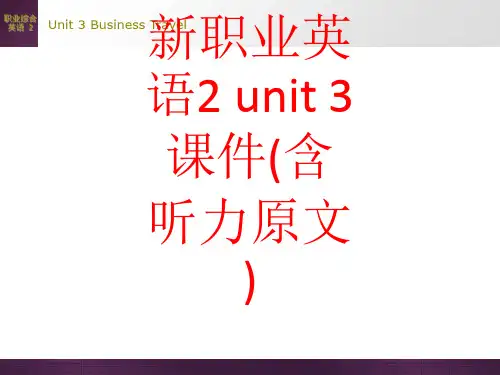
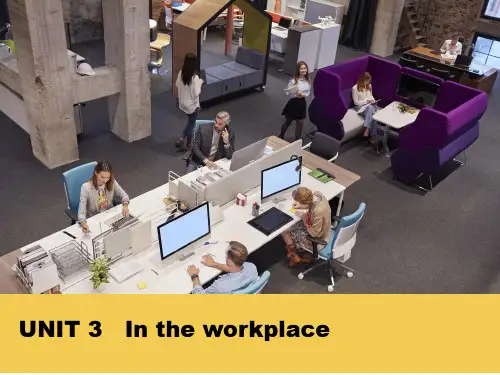
新职业英语视听说教程(上册)教案Unit 1 Organization/Script [skrɪpt]n.脚本,手迹; 书写体铅字; 剧本、广播稿或者电影剧本;vt.为电影(或戏剧等)写剧本; 编造;U1-Listening 1 - Task 1Benjamin: Good morning. I'm Benjamin Yang.Anna: Good morning, Mr. Yang! I'm Anna Brooks. Can I help you?Benjamin: Could you give me a brief introduction to your business?Anna: Well, our company, Nova, is a leading producer and exporter of electronics and our products have a high reputation for quality and design in the international market.Producer[prəˈdusə(r)] n.生产者,制造者; 制片人; 煤气发生炉; 自养有机体;Electronics [ɪˌlekˈtrɑnɪks]n.电子学; 电子学应用,电子器件; 电子工业; 电子流行音乐;Exporter [ekˈspɔrtə(r)] n.出口商; 输出者,输出国;Leading [ˈlidɪŋ]adj.重要的,主要的; 前列的; 首位的;n.行距; 铅框;v.领导(lead的ing形式);Benjamin: Ms. Brooks, how long has your company been in this line of business?Anna: For about 20 years since 1990.Benjamin: Wow! How large is your company then?Anna: Our company has more than 1,000 employees and our production and office space covers 75,000 square meters.More than=over Cover [ˈkʌvɚ]v.遮盖; 掩蔽; 涉及; 洒上;n.覆盖物; 避难所; 掩护; 封面;Benjamin: That sounds great. Here is my résumé. I'd appreciate it if you could arrange me an interview.Anna: We'll read your résumé and call you later if you meet our requirements.Benjamin: Thank you very much.Anna: You are welcome.U1-Listening 1 - Task 2Good morning, everyone. Welcome to Nova. I'm Anna Brooks from the Human Resources Department. First, I'll give you a brief introduction to our company. Established in 1990, our company produces a variety of electronics, for both domestic and foreign markets. At present, we have an annual turnover of US$85 million. Next, I will say a few words about the organization of our company. As you can see from this chart, our company is headed by Mr. Jack Black and divided into six departments: R&D, Marketing, Sales, Production, Finance, and Human Resources. The biggest one is the Production with four sections: Purchasing, Quality Control, Maintenance and Transport. Any questions so far?a variety of:[e vəˈraɪɪti ʌv]adj.多种的; 种种;domestic:[dəˈmɛstɪk]adj.家庭的,家的; 国内的; 驯养的; 热心家务的;n.佣人; 国货;turnover[ˈtɜrnoʊvə(r)]n.翻滚,翻倒,弄翻,逆转,转向; 半圆形的小馅饼; 营业额,成交量,证券交易额; [体育运动] 易手,失球;adj.可翻下的,或折转的;head [hɛd]n.上端; 头脑; 头部; 首脑,首长;vt.用头顶; 前进; 作为…的首领; 站在…的前头;vi.朝…行进; 出发; 向…方向移动; 船驶往;adj.头的; 在前头的; 首要的; 在顶端的;divide into[dɪˈvaɪd ˈɪntu]分成,分为;U1-Watching 1 - Task 1Bob: Alice, it's you! What a surprise meeting you here!Alice: Hi, Bob. Haven't seen you for ages! 很长时间; 许久;Bob: Yeah, we haven't seen each other since our graduation. How is everything?Alice: I will start working for TAF from next month.Bob: TAF? What do they do?Alice:They're one of the leading manufacturers of skincare and hair care products,which are sold mainly in Southeast Asia and Africa.Skincare['skɪnker] adj.护理皮肤的;Bob: When was the company set up? [sɛt ʌp] 建立; 准备; 安排; 引起;Alice: In the early 1990's. It'll soon be celebrating its 20th anniversary.Bob: How many employees are there in this company?Alice: Over 6,000.Bob: That is a big company! I'd like to wish you every success with your new job.Alice: Thank you! How about you, Bob? Do you still work for Otis Elevator?Bob: No, I've already left and started up my own business a year ago.Start up:[stɑrt ʌp](使)开始运转; 开始,着手;=runAlice: You're self-employed! That's marvelous! What line of business are you in?Self-employed:自营;个体经营的; self-service.marvelous [ˈmɑrvələs]adj.引起惊异的; 不可思议的; 非凡的; 神乎其神;Bob: I specialize in专攻,精通,以…为专业;专修importing and exporting chemical products.Alice: Fantastic! There might be chances for us to do business together.Bob: Definitely. This is my business card. Let's keep in touch.Alice: Sure.U1-Watching 1 - Task 2Alice: May I come in?Bill: Yes, come in, please.Alice: Good morning, Sir. My name is Alice Zhao. I'm a newcomer to Sales & Marketing Department.Newcomer [ˈnukʌmə(r)]n.新来的人; 新手; 新生事物;Bill:Good morning, Alice. Sit down, please. I'm Bill Smith, Manager of this department. Welcome to Sales & Marketing.Alice: Thank you, Mr. Smith.Bill: Just call me Bill. Have you reported to the Human Resources Department?Alice: Yes, Sir.Bill: Then, you've already got a brief introduction of our company?Alice: Yes, Mr. Smith. But I am a bit confused about the organizational structure.Bill: Well, it's not that complicated. Look at this organization chart.The company is headed by the Board of Directors董事会, which takes charge of company strategies and general policies. The Board usually appoints a CEO to take responsibilities for the company's daily operation.Complicate [ˈkɑmplɪkeɪt]vt.使复杂化; 使错综,使混乱; 使卷入; 变复杂;adj.复杂的; 麻烦的; (昆虫的翅)纵折的;Alice:Oh, I know Mr. Bruce Anderson is the CEO of our company. He was a business professor at a famous college before he joined our company.Bill: Yes. Our company is divided into five areas. They are: the R&D, the Sales & Marketing, the Production, the Finance, and the Human Resources.The biggest one is the Production Department. It has four sections: Purchasing, Quality Control, Transport and After-sales.Alice: What about our department then?Bill:Since our markets are mainly in Southeast Asia and Africa, our department is accordingly divided into two regional branches. Is that clear now?Accordingly[əˈkɔrdɪŋli]adv.因此,于是; 依据; 照着,相应地;Regional [ˈridʒənəl]adj.地区的,区域的; 特定区域的,特定地区的; 方言的; 区域性;Alice: Yes, very clear. Thank you.Unit 1 Organization / ScriptU1-Listening 2 - Task 1(Benjamin is chatting with another newcomer during the break.)Daphne: We have the Board of Directors, the CEO, and the shareholders. What are the differences between them? Shareholder [ˈʃerhoʊldə(r)]n.股东; 股票持有者;Benjamin: The shareholders own the company. They form the financial control system.Daphne: What does the CEO do?Benjamin: He is responsible for everything that happens in the company, acting as the official representative of the company. If there is only one person with absolute power in a company, everyone knows the power will go to the CEO.Act as[ækt æz]担当…,起…的作用; 充; 充当; 为;Representative[ˌrɛprɪˈzɛntətɪv]n.代表; 继任者; 议员; 类似物;adj.典型的; 有代表性的; 代议制的; 相当[类似](另一种属)的;Absolute [ˈæbsəˌlut]adj.绝对的,完全的; 不受任何限制[约束]的; 无条件的; 有无上权力或权威的;n.绝对; 绝对事物;Daphne: Isn't that too dangerous? Danerous adj. Danger n.Benjamin: You are right. That's the reason for having a Board of Directors. The Board is made up of a group of independent and unbiased people, to whom the CEO is responsible.Be made up of [bi med ʌp ʌv]由…组成;Independent [ˌɪndɪˈpɛndənt]adj.自主的; 不相关连的; 无党派的; 不相干的人所做的(或提供的);n.独立自主的人; 无党派人士;Unbiased [ʌnˈbaɪəst]adj.无偏见的,不偏不倚的,公正的; 持平; 无偏无党; 谠;Daphne: What does the Board of Directors do?Benjamin: They meet monthly, quarterly, or annually, providing long-term planning and vision, and acting as moralBenjamin: Yes, all the departments involved are busy with it now.Daphne: What departments are involved?Benjamin: Three departments: R&D, Production and Quality Control.Daphne: Teamwork again. How do they cooperate with each other?Benjamin: First, the R&D designs new products. The keyword in this phase is innovation.Daphne: Yes, that's why it takes a lot of effort, too.Benjamin:Then the Production comes in. As soon as the design proves feasible, the Production starts the assembly line and puts the design into real products.Feasible [ˈfizəbəl]adj.可行的; 可用的; 可实行的; 可能的;Daphne: How does the Quality Control collaborate with the other two?Collaborate [kəˈlæbəˌret]vi.合作,协作; (国家间的)协调,提携; 勾结,通敌; =cooperateCollaborate with[kəˈlæbəˌret wɪð]v.合作,与敌人合作,通敌;Benjamin: The QC takes random samples up to the lab for testing. Manufacturing problems are reported to the Production and design problems go to the R&D.Random [ˈrændəm]adj.任意的; 随机的; 胡乱的;n.随意; 偶然的行动;Daphne: I can see close cooperation among the three is the key to product quality.Benjamin: You're right.U1-Watching 2 - Task 1Bill: My name is Bill Smith. I'm the manager of Sales and Marketing at TAF. I'm responsible for sales and promotion of the company's products. Today I'm going to introduce to you my colleagues around the company. Here is my colleague, Alice. Today is actually her second day in our company and she's going to help me with this video. Come on, Alice! Here is Victoria. Hi, Vicky!Victoria: Hello, Bill.Bill: Please Vicky... Could you just give your name, your job title and a description of what you do?Victoria: Oh, is this for next week's trade fair? 商品交易会;Bill: Yes, we need to briefly introduce our company at the trade fair.Victoria: OK. Is your camera ready? My name is Victoria Song. I'm an assistant manager for international PR. I establish and maintain relationships with our overseas partners. PR(public relations)Bill: Thanks, Vicky... This is Dave, Manager of the Production Department. Hi,Dave!Dave: Hi, Bill. How's the preparation for the trade fair going?Bill: Actually, I'm working on it right now! Could you give your name, your title and a description of what you do? Dave:Sure. Hello, I am Dave from the Production Department. We are responsible for developing and manufacturing products.Bill: Thanks, Dave.U1-Watching 2 - Task 2Bill: Hi, Alice, how is it going so far?Alice:So far so good. Everything's interesting, except that n.除了…之外,只可惜the set-up here is still a little confusing—who's where and what's what.Bill: I see. Let me show you around and tell you how the company operates.Alice: You are always so nice!Bill: This way, please. Right there at the far end of the corridor on the right is the CEO's office. Have you met Mr.Alice: Not yet.Bill: Next to the photocopy room is the Finance Department. If you have any questions concerning your payment, you can come here.Concern [kənˈsɜrn]vt.涉及,关系到; 使关心,使担忧; 参与;n.关心; 关系,有关; 顾虑; 公司或企业;Alice: Payments for our products are handled here too, I guess.Bill: Yes. They offer us statistics about our sales performance as well. Opposite the Finance Department is the R&D Department. Requests and complaints from our clients shall be forwarded to them.Statistic[stəˈtɪstɪk]n.统计资料中的一项; 统计数据;统计量;(对总体具有代表性的)典型统计论;adj.统计(上)的,统计学(上)的;Alice: So, we'll cooperate a lot with the R&D.Bill: Right. Another department we often work with is the Production Department, next to the R&D. Orders from our clients will go to them.Alice: Are they responsible for dispatching and maintenance?Dispatch [dɪˈspætʃ]vt.派遣,调度; (迅速地)发出; 迅速处理,迅速了结; 处决(罪犯等);n.(使者等的)派遣; 急件; 迅速办理,快速处理; (记者发回的)新闻报道;Bill: Yes. The Transport Section and the After-sales Section handle those responsibilities.Alice: Thank you very much, Bill.Bill: By the way, if you have any trouble with your work, you can come to me. I'm the first person you can turn to for help. Turn to[tɚn tu](使)转向; (使)变成; 求助于; 翻书到;Unit 1 Organization / ScriptU1-Supplementary Listening - Task 1A: Where is H&M located?B: It's located in Texas, USA.A: How far is H&M from Scavo Town?B: It's about 70 km south of Scavo.A: What does the company produce?B: It produces tires. tire[taɪr]vt.使…疲惫; 使…厌烦;vi.厌烦; 疲劳;n.轮胎; 头饰; tie[taɪ]领带A: When was the company founded?B: It was founded in 1983.A:How many people work for H&M?B: More than 2,000 people work for it.U1-Supplementary Listening - Task 2A: My name is James Wilson, Business Manager of Sunshine Ltd. I've been with the company for nearly 11 years.It's my pleasure to introduce our company to you.B: Thank you, Mr. Wilson. Would you please tell me where your company is based?A: It is based in Dongguan, Guangdong Province, fairly central to the Pearl River Delta and close to Guangzhou.Fair[fer]adj.公平的; 合理的; 晴朗的; 美丽的;adv.公平地; 直接地; 清楚地; 正大光明地;n.集市,庙会; 商品交易会,展览会; 美人,美丽的事物;vt.(卡通制作)顺利接合; (动作)衔接协调; (飞机)装配平整; 使(飞机接合部)平滑;vi.转晴;Fairly [ˈferli]adv.适当,相当地; 公平地; 完全,简直; 清楚地;B: Oh, very good transport links. When was your company founded?Link [lɪŋk]n.环,节; [计算机]链接; 关联,关系;vt.连结; 挽住,勾住;vi.用环连接; 联系在一起;A: It was founded in 1983.B: What does your company mainly produce?A: Our main products are tires for cars and trucks, which are sold to countries and regions all over the world.B: Your company is doing a great job in this field. Thank you for giving me such a detailed introduction.U1-Supplementary Listening - Task 3When you walk through the main gate, you will see a neat, 4-storeyed building about 50 meters away. That is our Neat[nit]adj.整洁的,干净的; 灵巧的; 匀整的; 未搀水的; 4-storeyed:4层楼的office building where all executive departments are located. To the left of the office building is a workshop with five floors. The assembly line is on the first two floors. There, our workers are busy producing quality tires around the clock. There are two warehouses at the back of the workshop. One is for raw materials, and the other is for finished products. Beside the warehouses is a small building where maintenance staff work. They will be on the spot immediately if any machine breaks down. The yellow building on the right side of the office building is our canteen. It can cater for 2,000 people at the same time.on the spot :[ɑn ði spɑt]立刻; 当场; 在危险中; 处于负责地位;cater [ˈketɚ]vt.& vi.提供饮食及服务;vt.满足需要,适合; 投合,迎合;n.(骰子,纸牌的)四点;cater for [ˈketɚ fɔr]提供饮食及服务; 迎合;U1-Supplementary Listening - Task 4Our company specializes in organizing cultural events and language courses. With 40 employees, it is small in size, but quite complete in structure. The Managing Director is in charge of the whole organization including four departments: Science, English Language, Arts and Finance. The department managers report to the Managing Director总经理 directly. The English Language Department has two sections. One is the Cultural Section, dealing with various cultural events related to English, and the other is the Examination Section, where language exams and courses are set up. The Arts Department also has two sections—the Exhibition Section and the Library. The Finance Department is mainly responsible for managing company accounts and paying salaries. As our company is quite small, we don't have a team leader in each section but everyone works hard.U1-Supplementary Listening - Task 5A: Good morning, Mr. Lee. I'm Helen Grey. I'd like to give you a general picture of our company structure.General [ˈdʒɛnərəl]adj.大致的; 综合的; 总的,全体的; 普遍的;n.上将; 一般; 一般原则; 常规;B: Thank you, Ms. Grey.A: First, we have a Board of Directors. Philip Dickson is the Chairman, and Anne Roberts is the Managing Director, who reports directly to Mr. Dickson.B: How many departments are there in the company?A:Four in all: Production, Marketing, Finance and Personnel. David Peters is the Production Manager, Fiona Harris is the Marketing Manager, and Mark Taylor, head of the Finance.Personnel [ˌpɜrsəˈnel]n.全体员工; (与复数动词连用)人员,员工; 人事部门;B: How about the Personnel Department?A:Led(lead的过去式和过去分词) by Nina Smith, the Department has two sections: Recruitment[rɪˈkrutmənt]and Training. Paul Rees is the Recruitment Manager and I am responsible for training. LedB: Oh, I see. Thank you very much, Ms. Grey.A: My pleasure. Hope you enjoy working here.Unit 2 Office / ScriptU2-Listening 1 - Task 1Jack: Well, Mr. Anderson, I was wondering if I could come and meet you at 3 p.m. next Monday.Bruce: Sorry, Mr. Black. I am afraid I have another appointment at that time.Jack: Then how about next Tuesday?Bruce: I am afraid I might be attending an opening ceremony in the morning and going to a conference in the afternoon. May be=maybeCeremony [ˈserəmoʊni]n.典礼,仪式; 礼仪,礼节; 虚礼,客气;Jack: Is Wednesday OK for you?Bruce: I'll be leaving for Shanghai next Wednesday and probably won't be back until Friday afternoon. Look, why don't I call you back and set the time later? Leave for 而不是leave toJack: OK, let me tell you my telephone number.Bruce: Oh, I have already got your number.Jack: Good, when can I expect your call then?Bruce: Maybe in a week or so. 大约; 左右; 把;Jack: I'll look forward to your call.U2-Listening 1 - Task 2Bill:Alice, have you found the files I asked for? Mr. Anderson needs those files before his meeting with Jack Black.Alice: Sorry, Bill. I couldn't find any information on Jack Black. Maybe we don't have the files in our department. Bill: I am quite sure that the information was filed. Do you know we use the alphabetical filing system?我很确定信息是归档的。
周次:第周课次:第次授课时间:年月日Unit 3 Business Meals教学目标After studying this unit, students should be able to:Talk about office routinesKnow basic meeting procedures教学重点、难点重点:Language summary, Extensive listening, Extensive watching, Intensive watching, Intensive listening 难点:Intensive watching, Intensive listening, Extensive watching, Extensive listening课时安排:2 periods教学方法1.Discussing, listening, reading, presenting by the students;2.Explanation and demonstration by the teacher.教具Multimedia, blackboard教学内容和步骤Watching 2Task 1 Commenting on FoodStep 1 Warming- upLook at the following pictures and write down the country of origin of each food.Step 2 Extensive WatchingNew Words & Expressionsinviting a.吸引人的;诱人的The room looked cozy and inviting. 房间看起来舒适诱人。
water v.流口水The delicious smell from the kitchen made our mouths water. 我们闻到厨房的香味直流口水。
VLS B OOK 3AU NIT 2Y OU’RE HIRED!E XPERIENCE THE WORLDL ISTENING 12. AnswersQuestion 1: Why do you think we should hire you for this position?Question 2: What do you feel is your greatest strength?Question 3: What would you say is your greatest weakness?Question 4: Where do you see yourself five years from now?3. Answers1. work experience2. emotional intelligence3. project management software; online tutorials4. even more exciting challengesScriptsInterviewer: Thank you, Ken. I think that covers all the questions I had about your résumé.Now I’d like to ask you some more general questions. First, why do you thinkwe should hire you for this position?Ken: Well, I have three years of work experience as a manager with a proven record of strong performance in my former company’s New York office. I know Iwould be able to bring out the best in your staff and help your company reachits goals.Interviewer: OK. Now, let me ask you this: What do you feel is your greatest strength? Ken: I’d say my greatest strength is my emotional intelligence. I’m able to gauge others’ moods and emotions from their tone of voice and body language. Interviewer: Very good. Now, let me turn that around: What would you say is your greatest weakness?Ken: That’s a great question. I’d say it’s not keeping up with the latest project management software. Once I get comfortable with one system, I prefer not tochange. But I plan to start taking more online tutorials to get familiar with thelatest programs.Interviewer: That sounds like a good plan. So, where do you see yourself five years from now?Ken: One reason I’m applying for this position is that I’m looking for greater management challenges. After proving myself in this position, I’ll be able totake on even more exciting challenges as an experienced manager. Interviewer: That shows admirable ambition. I wonder if you could tell me why you left your previous company.L ISTENING 22. Answers1) self-assessment2) values3) career paths4) job search5) particular positions6) rewards3. Answers1. D2. C3. AScriptsAs many of our students are approaching graduation, today I’m going to talk about the issues you should pay attention to when looking for your first job. First, you should start with a self-assessment of your skills, values, and interest. Work with a career counselor on this, because it’s difficult to be objective when working alone.Once you’ve done your self-assessment, you can explore your career options and career paths. This process can be time-consuming. It involves reading about careers and talking to professionals in the fields that interest you. Informational interviews or even casual conversa-tions might be helpful. If you’re really serious about a career, consider job shadowing or an internship.Next, you can target companies for your job search. There are several aspects to consider. For example, look for companies that focus on employee development. In addition, investigate the rewards that companies offer. The quality of the company is important, too. It should look good on your résumé for future jobs.When you try to identify particular positions, there are many considerations concerning re-wards. Is the salary sufficient for your needs? Is the benefits package competitive? Remember that these may depend on the location. A salary that funds a great lifestyle in Buenos Aires might be too low to live on in Paris. And here’s a final piece of advice: Don’t fall into the so-called “salary trap” by looking for a higher, steady salary instead of a lower salary at, say, a tech start-up that might soon increase dramatically, resulting in much higher incomes in the long run.2. Questions:1. What can you do to explore your career options and career paths?2. According to the speaker, why should you avoid taking a job at a low-quality company?3. When you weigh the benefits package, what factor should you take into consideration?L ANGUAGE IN FOCUSU SAGE2. Answers1) a proven record of strong performance2) serious about3) keep up with4) gauge others’ moods and emotions5) turn that around6) target … for7) live on8) brings out the best inU NDERSTAND THE WORLDL ISTENING 12. Answer33. Answers1) flavors2) customer3) food science4) Island caretaker5) some gardening6) repair7) natureScriptsIt’s graduation season again, and I know all you students are working hard to find an awesome position in a great company. But take a break for just a minute and listen to this. Here are three jobs you can apply for that seem too fun to be real!First, there’s a large Italian ice cream company that hires people to develop and taste new flavors. These so-called “flavor gurus” do research and take customer suggestions to get ideas for the next delicious flavor. A food science degree or related training is required. They usually eat at least two pints of ice cream at work every week ‒ and even more at home! Or, how would you like to have a beautiful Caribbean island all to yourself? As an island caretaker, you can. When wealthy island owners fly off on their private planes, they hire someone to take care of their residence. Caretakers might need to do some gardening, cleaning, or repair work, but most of their time is free. If you love nature and don’t mind being alone, why not apply?Finally, how about hugging giant panda cubs for a living? The China Conservation and Re-search Center for the Giant Panda needs panda nannies. The nannies will spend all their work-ing hours with these wonderfully cute animals, holding, feeding, and playing with them. This job will put a smile on the faces of panda fans ‒ except when the baby pandas occasionally bite them. They’re not pets, after all!V IEWING2. Answers1. T2. F3. T4. F5. T3. Answers1) animation2) learning3) character animator4) effects5) screen6) physically7) courses8) draw9) Math10) picturesScriptsGet My Job - Virtual Reality AnimatorHi. Welcome to Animal Logic. I’m Matt, I work in virtual reality and this is how you get my job.That’s recording …At Animal we make a lot of films, and because we need to check how the films look on a big screen, we have our own cinema. Awesome! When I was growing up I always loved films, always loved ah animation especially, and for some reason it never occurred to me that that was an actual job, that people could be paid to do that. I still have to kind of pinch myself every day. I say, I, I, I … I get paid, it’s my actual job, to make things like, like a virtual Lego Batman, it’s… . So Animal’s been around for a while, so we’ve got lots of cool trophies over here, got a jukebox over there, everyone loves a jukebox.The best thing about my job is that I’m always learning. When I first started this job I started as a character animator, so I was making characters move and dance and talk; but then I fell into doing effects, did that for a while and then virtual reality came along.So, virtual reality: imagine you had a screen that you could strap on your head and the screen knew exactly where your head is at any point in time. And the thing is, when I put this on myhead it doesn’t just feel like looking at a screen, it feels like I’m inside a space, inside a room, inside a virtual room and that's what virtual reality is.And the clothes, yeah, because I do more, cute. That. T hat’s it. T hat’s it. T hat’s what I want.It’s only really been around for maybe a couple of years, but if you think of all the kinds of things that you might be able to do from just being here with a computer, rather than having to physically go to a place. So I could virtually go to a classroom on the other side of the world, or I could watch an operation happening. I could do so many things because I don’t have to physically be somewhere; but right now i t’s mainly games.So my typical day’s pretty various: I’ve done virtual owls that look pretty real, I’ve done talking holograms for Avengers, I’ve done Batman, Lego movies, I’ve had to come up with virtual Lego rain, all kinds of strange things.So, getting into VR specifically: there are university courses starting to appear, but by the same token you can learn a lot of this stuff by yourself. So the Internet is a fantastic resource: there’s all kinds of learning material out there, so that can be as simple as Photoshop, or that can be doing 3D programs; all the principles you can learn from stuff you can just download onto your home computer really easily.My top 3 tips for getting into this industry would be:∙Step 1, learn to draw; you don’t have to draw great, but just get comfortable with the idea of drawing and showing your work to others.∙(Step 2), get comfortable with Math; you don’t have to be amazing at Math, but just good enough that you can follow along.∙And step 3 would be get used to making pictures on a computer; if you can think of your computer as a big pencil, and you just get comfortable with that process, that’s a really good start.…I’m gonna take a selfie on that background, selfie node, arms up …Thanks for coming, and see you at the movies.L ISTENING 2V OICE OF C HINA2. Answers43. Answers1. returning to; abroad2. indicates; optimistic3. reverse culture shock; adapting to4. recruit; campusesScriptsAccording to the Ministry of Education, more young Chinese people than ever are returning to China after completing their studies abroad. The number of people returning from overseas increased from about 100,000 in 2009 to over 500,000 in 2018, and that figure is expected to rise.These people have various reasons for coming back. A recent survey indicates that being op-timistic about China’s future is the most important reason. They also mentioned being close to family, accessing China’s booming job market, and enjoying the comfort and convenience of the Chinese lifestyle.Once back in China, these people find both advantages and disadvantages. On the one hand, their knowledge of foreign languages, cultures, and management makes them valuable to companies that do business internationally. On the other hand, they may experience some-thing known as “reverse culture shock”, which means they have difficulties adapting to the domestic job market and Chinese workplace culture.These people who’ve studied abroad have made a lot of contributions in various industries. By virtue of their broad knowledge and international experience, they have been placed in positions to bring new management concepts. Moreover, some companies listed on foreign stock exchanges are either run or funded by people who returned from abroad. As such, Chi-nese students are warmly welcome back home after completing their studies abroad. Some Chinese companies even recruit young Chinese people on foreign university campuses.F URTHER LISTENINGC ONVERSATION1. Answers1. A2. A3. B4. DScriptsCharles: Hi, Kiki!Kiki: Hi, Charles. What’s up?Charles: I’m heading toward the career counseling center. Graduation is a year away, and I’m not sure whether to get a job or continue on and get my Master’s. Have you given itany thought?Kiki: Oh, yes! I’ve done tons of research. I read that there are plenty of job openings for people like us getting a Bachelor’s in computer science. You don’t need a Master’sdegree to get a job, but, of course, if you do, it would have some advantages. Charles: Like what?Kiki: Well, people with a Master’s get paid more in the long term. For example, the average yearly salary of an employee with a Master’s in computer science is about15,000 dollars more than that of one without it.Charles: Hm. That’s a lot.Kiki: It is. Besides, doing a Master’s will usually require you to do research. That is a valuable experience that can benefit you for your whole career.Charles: Hm. Maybe you’re right. Although I heard that some companies even pay for your Master’s degree studies.Kiki: That’s true. Some companies do offer support for tuition.Charles: That would be great. I’m starting to think I’ll go directly to a company. What about you?Kiki: I’m probably going to get a Master’s first. I really enjoy studying, and I want to learn more specialized skills. I’m particularly interested in cybersecurity. Plus, it’ll helpme get a management position and move up the corporate ladder as quickly aspossible.Charles: That’s great! I think you’d make a fantastic manager.Kiki: Thanks, Charles! That’s very nice of you to say so.Questions:1. What does the woman say about getting a Master’s degree?2. What did the man hear about some companies?3. Why is the woman interested in getting a Master’s degree?4. Which of the following is true about the woman and the man?P ASSAGE 12. Answers1. C2. C3.DScriptsAccording to a recent study, the use of AI in recruitment is predicted to grow over the next five years. This will help to improve the recruitment process by scanning résumés, automating interviews, and removing bias in candidate assessment.The huge number of résumés that corporations receive is nearly impossible for a human to go through. AI-powered résumé-screening software, however, can review thousands of résumés in seconds.The software checks résumés and searches for relevant information. It also removes sources of bias by assessing a candidate without referring to their gender, age, or even name. The software identifies desirable employee characteristics by comparing candidates’ résumés with those of successful professionals.Another innovation is AI-powered interview software. The software asks questions and analyzes the answers, even evaluating a candidate’s voice to decide whether the individual is being honest. Although it is currently only an initial step in the hiring process, recruiters find it helpful for interviewing, assessing, and hiring candidates.AI in recruitment still faces challenges. Many recruiters don’t trust AI yet, and AI sometimes follows the biases in existing systems, such as hiring from particular universities. However, many believe that the advantages of AI in recruitment outweigh the disadvantages.Questions:1. What can we learn about AI from the news report?2. How can AI-powered interview software decide whether someone is telling the truth?3. What is the problem that AI in recruitment faces?P ASSAGE 23. Answers1. D2. C3. A4. CScriptsGraduation is approaching, and many of you will be beginning your job search. Interviews are a central component of the recruitment process. You already have some general ideas about face-to-face interviews. In today’s workshop, we’re going to review three specific types.First, there is the candidate group interview, where several candidates are interviewed simul-taneously to allow the interviewer to assess how you interact with others. You should expect role-plays and group activities to test your social and leadership skills. To make a good im-pression, don’t be shy, and treat the other candidates as partners, not rivals. Listen to them carefully, and respond to what they say, just as if you were members of a team.Second,a panel or committee interview involves one candidate and several interviewers. It’s crucial to connect with them all because they all have a say in the hiring decision. Therefore, learn their names and their positions, ideally before the interview. This will help you to focus on each interviewer in turn as you speak and respond appropriately to their questions and also help you to make a connection.Finally, some high-pressure industries conduct stress interviews to test how candidates perform under pressure. The interviewer might ask you, “How do you think this interview is going?” or suddenly ignore you. Whatever happens, remember it’s a test and that the interviewer is probably a nice person. Don’t be afraid to ask questions, express yourself clearly, and, above all, keep your cool.Questions:1. In which type of interview is teamwork important?2. What does the speaker suggest for a panel interview?3. According to the speaker, what might happen in a stress interview?4. What is this introduction mainly about?P ASSAGE 34. Answers1) on the back2) a coffee shop3) 35 times4) fancy pink font5) Japanese paperScriptsI’ve been a recruiter for over 20 years, and I must have reviewed close to a million résumés. I think I’ve seen every mistake possible. Let me tell you about a few.I don’t think all résumés should follow exactly the same pattern, but they should follow cer-tain guidelines. I once received a résumé that seemed to have no address. By chance, it fell off my desk, and I saw the contact information on the back! Bad idea! It should be clearly visible near the top of the first page.I remember another résumé for an accounting position. The work experience section included the top accounting firms in Australia and New Zealand. I was impressed until I got to the end, where the candidate included a college job in a coffee shop. You should remove irrelevant work experience. It doesn’t help and gives the impression that you didn’t edit your résumé.I once reviewed the résumé of an excellent manager but was surprised to see that he used the word “I” 35 times in the work experience section. It’s repetitive and unnecessary. Since it’s your résumé, whoever is reading it knows that it is about you!Finally, a designer submitted a résumé in a fancy pink font on beautiful Japanese paper. Unfortunately, it was almost impossible to read. Hiring managers have limited time. That’s why we like clear résumés. Be careful using colors, unusual fonts or font sizes smaller than 11 points.。
Unit 3 Business MealsObjectives:1.Grasp the main idea (the essence of writing is to write what one enjoys writing) andstructure of the text (narration in chronological sequence);2. Listening strategy and methods.2.Master the key language points and grammatical structures in the text;3.Conduct a series of listening, speaking and writing activities related to the theme of theunit.Focuses:1. the main idea of the reading A, and readingB etc.2.Grasp the main idea;3.Appreciate the narrative skills demonstrated in the text;4. Master the key language points and grammatical structures in the text;Outlines:Pre-reading tasks: Warming -upTask 1 Complete the following table seating arrangement.Task 2: Principles of Seating Arrangement1.Seat people who have common interests together.2.Pair male and female guests.3.Seat guests of honor in order. The most important person should be seated at the right hand of the host.While-reading tasks:1.Grasping the structure of the text (15 m)2.Cultural background –the study of Reading A ___Deals Over Meals and the studyof Reading B ___Friendship Lunch Menu(45m')3.T explains language points and gives Ss practice. (60 m)4.Grammatical structures (25 m)5.T draws Ss attention to Writing Strategy in Theme-related Language Learning Tasks(12 m)6.Synonymous words or phrases in this text (15 m)7.T will show Ss the importance of Formal Invitation in writing. (5 m)Post-reading tasks:1. Decide which of the following behaviors are Do’s or Don’ts for business meals accor ding to the passage (5 m)get nervous talk too muchshow style and grace choose the correct silverwarebe a good listener talk with confidenceinterrupt other people start with the nearest dinnerware2.Business Know-how● Give gifts during special holidays, or as “thank-yous” for special invitations;● Do not give expensive gifts;● A small cultural gift from your country is usually appropriate;● Package your gift nicely, with a card attached to it.3. Do Self-study Room exercise s page 47 to page 48 : Passive VoiceTime allotment:Pre-reading tasks:Henry is retiring on Monday. Mr. Nelson, Chairman of your company, asks you to arrange the table seats for Henry’s farewell dinner. Here are some principles for arranging seats at a dinner table and the information about the guests.Principles of SeatingArrangement1.Seat people who have common interests together.2.Pair male and female guests.3.Seat guests of honor in order. The most important person should be seated at the right hand of the host.Who would you put in seats A throught E?Guest InformationHenrymale, former HR Manager.Susanfemale, CEO. She loves traveling.Georgemale, Sales Manager.Davidmale, Production Manager. He loves traveling.Maryfemale, Customer Service Manager, a good friend of George.While-reading tasks:1 Grasping the structure and the language points of Reading A ---Deals Over Meals (15 m):e.g. 1. I’ll entertain my friends over the weekend.2. The child was entertaining himself with his toys.e.g. 1. They have built up a good reputation.2. The noise built up until she couldn’t stand it any longer.e.g. 1. I only wear this suit for formal dinners.2. Our boss is very formal; she doesn’t call anyone by their first name.e.g. I do not imply that you are wrong.e.g. Well, take it easy! It isn’t a matter of urgency.e.g. Rita’s husband is away for the week, so I thinkI’d better go over and keep her company.e.g. 1. That man we met turned out to be Maria’s second cousin.2. Don’t worry. I’m sure it will al l turn out fine.e.g. It usually pays to tell the truth.e.g. I want you to be on your best behavior at Granddad’s.e.g. Dick is very knowledgeable about wines.e.g. 1. This overcoat has seen me through many severe winters.2. He saw me through all the hard times.e.g. All teachers regard Jimmy as an intelligent student.e.g. I’ll put these bottles in the cupboard—they might come in handy someday.e.g. 1. Public figures have a duty to conduct themselves responsibly.2.The company conducted a survey to find out what their customers think about the new product.e.g. She was concentrating on her book and didn’t know what had happened.e.g. She was concentrating on her book and didn’t know what had happened.e.g. Doctors are the most sought-after people in the area.3.For reading B: Friendship Lunch Menu友谊国际宾馆午餐菜单Task 1 Decide whether the following statements are true (T) or false (F) according to the menu. ( ) 1. In the menu tuna fish is served as a maincourse.( ) 2. Grilled steak is dressed with garlic sauce.( ) 3. There are cakes and pies for dessert.( ) 4. You can choose two main courses for eachset lunch.( ) 5. You can have your lunch in Coral Room or Harbor Room.Task 2: Fill in the blanks in the following menu with the given dishes.A. French Onion SoupB. Banana PuddingC. Chocolate Ice CreamD. Roast TurkeyE. Strawberry CakeF. Mixed SaladG. French Steak4. For Writing Strategy:Task1:1. On what occasions do people send and receive invitations?-------On many occasions people will send and receive invitations, such as a celebration, a banquet, a reception, a party, a dinner, a concert or just a football match.2: On many occasions people will send and receive invitations, such as a celebration, a banquet, a reception, a party, a dinner, a concert or just a football match.-------An invitation usually includes the event, date, time and place. If necessary, indicate the appropriate dress, or ask for a response by a specific date.Task 2 Read the invitations below and complete the following statements.The dinner for ________________________ will be held at Grand Hotel.2. Sarah invites her friends to ___________________.3. “RSVP” means ___________________________________________________.5. Bob invites Lisa to _______________.Task3 :Formal and informal Invitations5: Mini-projectWork in groups. Search online for the rule of table setting for a western dinner. Then set the following tableware and explain to the class.●Work in groups;●Search the Internet for rules of table setting;●Pay attention to the functions of different pieces of tableware;●Good time management and cooperation;●In-class oral presentation.6. Grammatical study_____Passive V oice page 47 (25 m)7: Exercises : Task 5: Language for LabTranslate the following into English using the given words or phrases.1. 在工作中谨慎小心会大有裨益。
周次:第周课次:第次授课时间:年月日Unit 3 Business Meals教学目标Ss are introduced to the vocational skills covered in this unit and learn how to treat clients appropriately over business meals.教学重点、难点重点:Language summary, Extensive listening, intensive listening难点:Extensive listening, Intensive listening课时安排:2 periods教学方法1.Discussing, listening, reading by the students;2.Explanation and demonstration by the teacher.教具Multimedia, blackboard教学内容和步骤Listening 1Task 1 Telephone InvitationStep 1 Warming-upSuppose you’re going to invite your friends to dinner. Make some preparations before you send an invitation by filling in the following blanks.Step 2 Extensive ListeningNew words and expressionsinformal a.非正式的;日常使用的I meant it to be an informal discussion, but it didn’t turn out as I intended. 我本想随便商量一下,结果事与愿违。
economic a.经济学的;经济的the government’s economic policy 政府的经济政策forum n.论坛;讨论会The letters page serves as a useful forum for the exchange of readers’ views. 读者来信版是读者们交换意见的有益园地。
get-together n.聚会We’re having a little get-together to celebrate David’s promotion.我们为戴维的晋升开一个小型庆祝会。
pick sb. up 接人I’ll pick you up at 7 o’clock. 7点钟我开车来接你。
●Extensive Listening ---Bill Smith invites Susan Jones to attend a dinner party. Listen to theconversation and decide whether the following statements are true or false. Then write down the key words to support your answers.Step 3 Intensive ListeningListen to the conversation again and answer the following questions.Step 4 Language SummaryRead the following sentences, paying special attention to the use of modal verbs (情态动词) to soften request.1. ... if I could visit your company while I’m here.2. It would be an honor to have you visit us!3. I would like to invite you to a dinner party that evening.4. ... that would be great!5. Would Friday 6:00 p.m. be OK with you?Task 2 Restaurant ReservationStep 1 Warming-upDifferent people have different eating habits or requirements. Tick (√) the proper food in the right column for the people in the left column.Step2 Extensive Listening●New words and expressionsMuslim a. 穆斯林的;伊斯兰教的n. 穆斯林(即伊斯兰教信徒)Friday is a holiday in Muslim countries. 在伊斯兰教国家中星期五是假日。
taboo n. 禁忌;忌讳Any mention of politics is taboo in his house. 在他家里一提政治就犯忌。
absolutely ad. 完全地;绝对地I trust his discretion absolutely. 我完全相信他的判断。
vegetarian a. 吃素的;素食者的n. 素食者Many of my friends are vegetarian. 我朋友中有不少是素食者。
cater v. 提供饮食及服务;迎合Fifty is a lot of people to cater for! 承办50人的饮食可够多的!buffet n. 自助餐;快餐Dinner will be a cold buffet, not a sit-down meal.正餐是凉的自助餐,不是坐着让人侍候的那一种。
beverage n.饮料We do not sell alcoholic beverages. 我们不卖酒精饮料。
non-drinker n.不饮酒的人I am a non-drinker. 我不喝酒。
mineral a.矿物的;含有矿物质的We are digging for mineral deposits. 我们正在掘地探矿。
neat a.巧妙的;整洁的She laid her dress on the bed to keep it neat. 她把连衣裙放在床上以保持平整。
cater for 提供饮食及服务;迎合TV must cater for many different tastes.电视节目必须迎合各种人的爱好。
in that case 若是那样的话In that case you'll have to clear yourself. 那样,你只得自行辩白了。
Extensive Listening---Alice is making a dinner reservation at Mr. Collins’ restaurant. Listen to the conversation and answer the following questions.Step 3 Intensive ListeningListen to the conversation again and decide whether the following statements are true or false. Then write down the key words to support your answers.Step 4 Language SummaryUse the suffix “-free” to form new words and write down their Chinese meanings after the example.课后作业:Finish the rest part of corresponding exercise课后小结:周次:第周课次:第次授课时间:年月日Unit 3 Business Meals教学目标Ss are introduced to the vocational skills covered in this unit and learn how to treat clients appropriately over business meals.教学重点、难点重点:Language summary, Extensive watching , Intensive watching难点:Intensive watching, Extensive watching课时安排:2 periods教学方法1. Discussing, listening, reading, presenting, and role-playing by the students.2. Explanation and demonstration by the teacher.教具Multimedia, blackboard教学内容和步骤Watching 1Task 1 Restaurant ReservationStep 1 Warming-up.Suppose you’re booking a table at a restaurant. Make sentences according to the tips g iven below. People: I’d like to book a table for me and my parents.Time: 7 p.m. on FridayWould you please hold the table until 7 p.m. on Friday?Requirement: a table by the windowI would appreciate it if you can give us a quiet table by the window.Step 2 Extensive WatchingAlice is making a reservation on the phone. Watch the video clip and decide whether the following statements are true or false. Then write down the key words to support your answers.New words and expressionsavailable a.可用的;可得到的Do you have a room available? 你们有空房间吗?bother v.打扰,烦扰;麻烦Does my smoking bother you? 我吸烟会不会影响你?prohibit v.禁止;阻止Smoking is prohibited. 禁止吸烟。